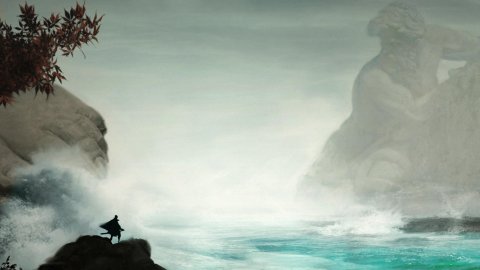
Project Galileo
The Italian team Jyamma Games will be present at the Tokyo Game Show 2021, from 30 September to 3 October 2021 with Project Galileo, a new game described as a Souls-like set in Italy, which will therefore also be presented within the Japanese fair. br>Francesco Abbonizio, formerly Associate Technical art Director of Ubisoft and Technical environment artist of Cd Projekt Red, will talk about his role as Creative and Art Director at Jyamma Games, as well as showing something of Project Galileo, currently in development at the team.
This is the international debut of the Milanese development studio, which will use the event to present its video game under development to the publishers of Asia - Pacific: Project Galileo is a Souls-Like developed and set in Italy where the player will find himself immersed in the Italian cultural and landscape beauties.
The idea is undoubtedly particular and we are therefore waiting to find out more. Giacomo Greco, CEO of Jyamma Games, explained the reasons behind the choice to invest in TGS: "The time is ripe, Jyamma Games is ready to introduce itself to the Asian public, extremely qualified and passionate about the type of video games like the one we are developing. , the Souls-like, an action role-playing game born, in fact, in Japan.
Project Galileo, one of the first artworks showing the particular setting It is therefore essential to take part as an exhibitor at the Tokyo Game Show , an extremely important place for us and for our Project Galileo because 45% of world gamers are Asian. "
According to the Italian team, therefore, Project Galileo has the potential to be able to establish itself in Japan and in Asia, not very easy territories for those arriving from abroad and with a not huge production behind them, but the idea of combining the Souls-like genre with Italy, as a setting, could be a winner.
In the meantime, we also remind you of the complete calendar of the Tokyo Game Show 2021 event, which is now upon us.
Have you noticed any errors?
Galileo Project: Religion, science and the search for extraterrestrial life
 © Getty Images space_telescope_venus
© Getty Images space_telescope_venusDuring the Jewish High-Holidays, Rabbi Rob Dobrusin at the Beth Israel Congregation in Michigan gave a sermon incorporating my book 'Extraterrestrial.' The sermon was posted on Twitter, prompting an existential debate.
A member of the congregation who heard the sermon asked me whether I believe that humans are made in the image of God. As a scientist, I concurred with this notion as long as we identify God with nature, similarly to the view advocated by the rational philosopher, Baruch Spinoza.
Harvard historian and professor Erez Manela, wrote to me, 'it's striking how your work is shaping religious sermons but not surprising given how it bleeds into questions of the meaning of life and humanity's place in the universe.'
Princeton astronomer and professor Neta Bahcall said to me, 'very interesting how this has reached and touched such important and unexpected places.
The possible existence of intelligent extraterrestrials touches upon the most fundamental aspects of human existence. The natural objects that astronomers study routinely, such as stars, black hole, dark matter or the cosmic microwave background, obey without exception the strict the laws of physics and lack the freedom associated with human consciousness.
Finding extraterrestrials would feel like discovering cosmic relatives whom we never met, and who can unravel family secrets from our past. The implications of their existence are looming too large to be encapsulated by scientific equations and extend well beyond the halls of academia.
The recently announced Galileo Project aims to employ the standard scientific method in finding out whether technological equipment from extraterrestrial civilizations exists near Earth, as hinted by the recent Unidentified Aerial Phenomena report to Congress or the discovery of the weird interstellar object, `Oumuamua. Finding that we are not the smartest species out there could have broad implications to our most fundamental puzzles:
We can continue down this list of existential questions without limit. For now, thinking about extraterrestrials is equivalent to thinking about a better version of ourselves. And so let us stay hopeful as the Galileo Project searches for signs of cosmic neighbors out there. And while we are waiting, let us improve ourselves so that we will deserve their respect when we meet them. If I were a Rabbi, this would have been my sermon.
Avi Loeb is a member of the American Academy of Arts and Sciences and was the longest-serving chair in the history of the astronomy department at Harvard University (2011-2020). He serves as the founding director of Harvard's Black Hole Initiative, the director of the Institute for Theory and Computation at the Harvard-Smithsonian Center for Astrophysics, and chairs and the advisory board for the Breakthrough Starshot project. Loeb is the former chair of the Board on Physics and Astronomy of the National Academies and a former member of the President's Council of Advisors on Science and Technology at the White House. He is the bestselling author of 'Extraterrestrial: The First Sign of Intelligent Life Beyond Earth,' recently published by Houghton Mifflin Harcourt.